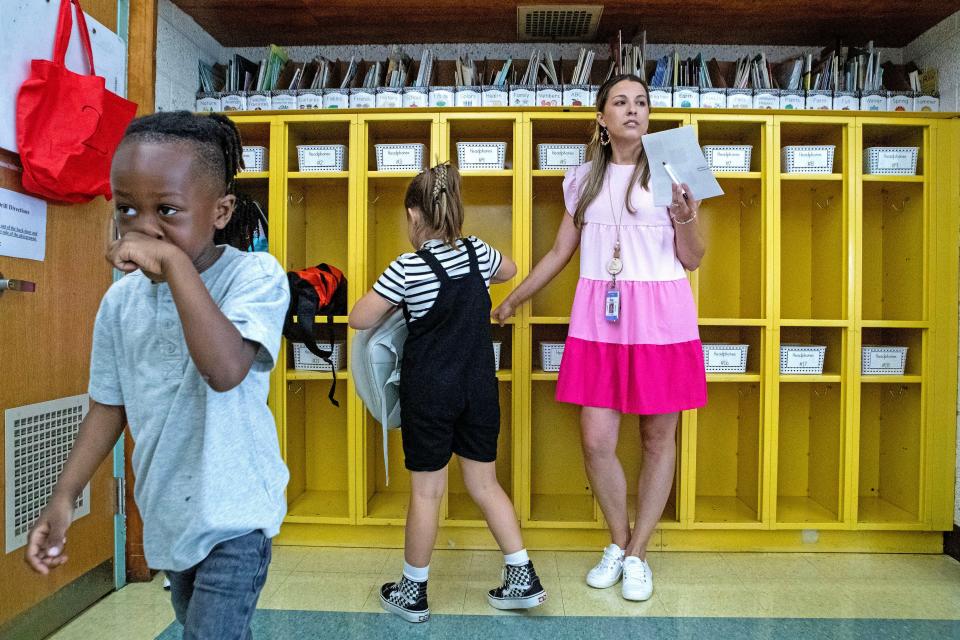How much do you know about foster care? These Delawareans hope to boost awareness
Nothing could really prepare them for the first call.
“The first feeling is panic,” said Mike Lennon, smiling to his wife, Rebecca, beside him.
“Especially initially, like when you get the first call, you don't know the right questions to ask. You know, how old is the child? Do they have siblings? Do they have any health concerns, any behavioral issues? You just kind of gloss over, and either you say yes or no.”
The Lennons said yes to fostering in 2021, at first in hopes to grow their family. Through the years, they’d open their Claymont home to three children, alongside training and support from Children & Families First.
It would set them on a path of both fulfillment and complicated emotions they still struggle to describe — but would never change.
“We just had to jump off the deep end, and go with it,” Rebecca said. “It’s sometimes hard to explain to people what foster care is like, but the rewarding aspect is giving these children a life that they may not have had otherwise.”
They are not alone trying to explain it.
Delaware advocates have been pushing to raise awareness of foster families, from campaigns to a new book, as they say a shortage persists. Kicking off National Foster Care Month, the Division of Family Services began an initiative in May aiming to recruit 100 new families to its system.

Today, just under 600 children need temporary homes across the state at any given time, according to the division's Director Trenee Parker. They are infants, teens and many in between, from all racial backgrounds, who have been removed from their homes due to abuse or other trauma.
But after the COVID-19 pandemic, Parker’s team watched foster families drop. She estimates 50 to 75 fewer homes compared to pre-pandemic, while reports of child abuse and neglect have risen 3.4% from 2022 to 2023.
“As we started to move out of the pandemic and children returned to the classroom and returned to regular visits with their pediatricians — we saw an increase in reports to our report line. And that increase continues,” Parker said. “We would like to raise public awareness about what it takes to be a foster parent.”
There are group homes and foster homes in Delaware. Most families connect with the state's Foster Care Program, but seven private agencies also contract with DFS to license parents. One such agency, Children & Families First, has provided these services for over a century. And this spring, it’s also striving to boost visibility.
Four team members came together to write “A Kids Book About Foster Families,” hoping soon to see it shelved across Delaware schools.
“There really wasn't anything out there that helped kids who were in foster care to understand, in a strength-based way, how this happens, why they're in foster care, or to help their friends understand why,” said Mike McHugh, program supervisor and adoptive former foster parent.
“And, we thought it would be a great tool to help recruit people to become foster parents — because there's a huge shortage.”
School safety: Seaford schools to move forward with weapon detection systems, clear bag policy
Learning from experience

The Lennons quickly learned they can't be saviors.
A little boy came to the doe-eyed Mike and Rebecca, ready to open their hearts like their house in August 2021. But soon, the couple would realize they couldn't support his medical needs.
“When our first child left our home, we were floored,” Mike said. “And Becca was like, ‘I don't know if I can do this again.’”
The pair had heard it all in training, but they had to face fostering misconceptions head-first. This isn’t adoption. Reunification is the goal, and not only children can be touched by trauma.
They did try again, though. Mike and Rebecca supported another young boy in October, until he was reunited with his aunt a few months later. Then, they answered another call in January 2022 to take in a baby girl just 2 weeks old. They faced restless nights, as the infant weaned off drugs in her system at birth.
“It's like getting hit by a truck,” Mike said simply.
“Like yeah, it hurts this time. But maybe the next time it's like getting hit by a slightly smaller truck. And to us, that has rung true — you’re able to deal with more stress and adversity as time goes on. It makes you more resilient, and then you're able to really jump in and put your feet in there for the children, because that's what they deserve.”
That baby girl is Khloe.
And as of January, the Lennons did formally adopt the now-toddler. The new family now navigates how to keep some connection with her birth mother, who’s doing better.
“It's just realizing that you have your limits in this process,” Rebecca said, knowing such limits and unpredictability extend in many ways to all parents — adoptive, birth or foster. "What's been pretty eye-opening is that our capacity to love kind of knows no bounds."
Her family fell in love, but they also grew to see fostering as the safety net it should be. Even when it's brief.
“Our path moving forward, we just want to make a difference and help people realize that these children just need good homes to go to, whether it's temporarily or whether you're looking to adopt,” the mom said. “And you can't let the fear of the unknown keep you from doing that.”
Beach guide: Finding learning opportunities for your family's next Delaware beach vacation
What to know about becoming a foster family in Delaware

It’s not for everyone.
Kim Dugger would tell that to anyone who asks, but she also believes fostering isn’t revolutionary. The retired Philadelphia police detective decided she would do it long ago.
“It may sound strange, but actually, I thought about being a foster parent when I was in seventh grade,” said the now part-time employee at Appoquinimink schools. She had a close friend who lived with an older foster parent, who didn’t drive or get around well.
“If we were in trouble at school, it seemed like her punishment was harsher than the rest, because she didn't really have anyone to fight for her,” said the 63-year-old. “So that's when I decided, when I grew up, I was going to be a foster parent. And they would not be able to treat my kids differently.”
First, she led a career in Philadelphia's Special Victims Unit. Then, after raising her own three kids, navigating a divorce and taking care of both aging parents and grandkids, Dugger retired in Delaware. She bought a house. She looked around at its three bedrooms and a bustling school district.
“This is the time,” she remembers thinking, some six years ago.

Dugger told Children & Families she wanted to be a home for teens. Some families may worry about behavioral challenges, but Dugger knows her naturally born kids brought some of their own, too. Over the years, she has now fostered four or five teens long-term, she said, with some shorter spurts and assistance to other families.
Delaware is particularly in need of families willing to open their homes to teens, as well as sibling groups, youth with special needs and medically fragile children, according to DFS.
Such eligible foster parents are:
Single, married, divorced or widowed
At least 21 years of age
Renting or owning their home
Attend a three-hour information session
Participate in 27 hours of pre-service training
Pass a criminal background check and fingerprint screening
Any race or religion
Pass home, health and safety studies
Economically stable
Able to provide references
Whether through the state, private organizations or the greater fostering community, support also exists along the way.
In Legislative Hall, lawmakers this year have considered bolstering a Foster Care Tuition Waiver Program, which offers youth who have spent their teens in Delaware foster care waivers on college tuition and fees at public, in-state schools — University of Delaware, Delaware State University, Delaware Technical Community College.

No parent called the process easy. But in the throws of fostering, support can look like a caseworker, foster-parent support groups, tax-free stipends to financially support the youth, access to therapy, other training sessions and more.
Back in the courtroom, Mike and Rebecca had some 60 people attend Khloe's adoption, with 50 more on Zoom.
"We had like her therapists, we had other people that were important that got us through these times in our lives," Rebecca said through a laugh. "I think it's just building that village and that support system that's so important."
Delaware real estate: Condos approved in Sussex, 54-lot development coming to Long Neck
How can you learn more about fostering?
Division of Family Services, Foster Care Program — 302-633-2657
A Better Chance for Our Children — 302-746-7265
Child Inc. — (302) 762-8989
Children and Families First — 302-658-5177
Children’s Choice — (610) 521-6270
Pressley Ridge — (302) 854-9782
Progressive Life Center — (202) 842-4570
Got a story? Kelly Powers covers race, culture and equity for Delaware Online/The News Journal and USA TODAY Network Northeast, with a focus on education. Contact her at kepowers@gannett.com or (231) 622-2191, and follow her on X @kpowers01.
This article originally appeared on Delaware News Journal: What do you know about foster care? These Delawareans want more awareness

